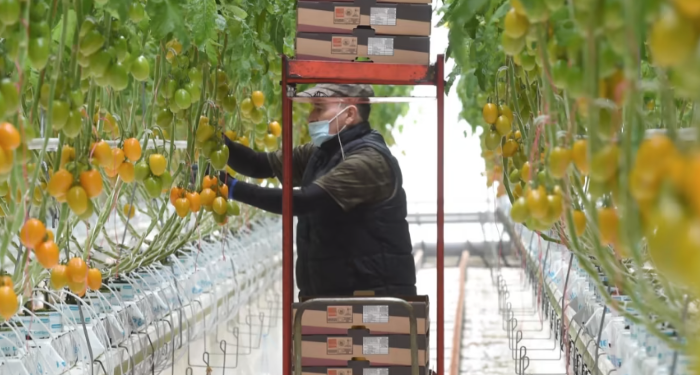The industry warns that a sharp increase in the cost of heating greenhouses and other energy-intensive processes will lead to a shortage.
The industry warns that a sharp increase in the cost of heating greenhouses and other energy-intensive processes will lead to a shortage
FIG.1
Tony Montalbano’s family has been growing vegetables in the south-east of England for decades, without stopping work due to recessions, economic shocks or high inflation.
However, this year sharply increased costs for heating greenhouses due to the aggravation of the energy crisis caused by the conflict in Ukraine, forced him to consider the possibility of abandoning the cultivation of the usual crop of cucumbers.
“Prices are out of control, they are terribly high,” said 40-year—old Montalbano about electricity bills. “The gas just jumped, and I wasn’t ready for that.”
He added that this year the volume of production on his farm in Essex County will be halved due to attempts to reduce costs.
Farmers and food companies are cutting production across Europe as they struggle to cope with the sharp rise in energy prices. Montalbano’s electricity bill is about five times more than at the same time last year. The industry warns of possible seasonal food shortages and calls for state support after Vladimir Putin cut gas supplies in response to Western sanctions.
Crops that require intensive heating in colder climates, such as cucumbers, tomatoes and lettuce, suffer the most. However, the scale of the impact of the energy crisis on the European food supply chain is much greater: bakeries, dairy farm owners and other producers, including sugar beet and olives, also have difficulty paying bills, as costs increase much faster than the prices offered by wholesale companies.
Costs are rising
Pekka Pesonen, secretary general of Copa-Cogeca, an organization representing the interests of European farmers, said this week that the consequences of high bills were more serious than expected. Prices for resources such as fertilizers and animal feed have risen sharply, while farmers had to refrain from planting crops due to increased costs for cooling, heating and transport.
The EU is discussing plans to limit energy prices for companies and households, and also demands to reduce consumption, which could hit farmers. The UK has unveiled a plan that will support business, but only for six months.
However, for many it is already too late. Jimmy Russo, co-owner of the British company Valley Grown Salads, said: “I suspect that 75-80% of British salad growers will not plant next year… because it’s not profitable. We can say that the salad sector has been abandoned.”
The hot weather this summer has exacerbated the problem, which is why Rousseau was unable to grow most of the usual crop. However, gas, which last year cost him 50 pence per term, now costs £3.75, and in winter he will have to pay £5 per term.
“You can’t sell a cucumber for £2.50,” he added.
In the Netherlands, which accounts for almost a fifth of the world’s tomato exports, many greenhouses will be left without electricity.
Companies that usually use lighting to grow tomatoes “most likely won’t do it in winter because of high electricity prices,” said Alexander Formsma, an energy specialist at Glastuinbouw Nederland.
Альфред Педерсен и сын, крупнейший поставщик помидоров в Швеции и Дании, под контролем которого находятся теплицы площадью 350000 квадратных метров, заявил, что этой зимой он также перестает работать. Компания поставляет в супермаркеты 20000 тонн помидоров в год, из них около четверти выращивается зимой.
По словам Торбена Ролла, операционного директора компании, по сравнению с прошлым годом расходы на электроэнергию выросли в десять раз.
“The supply chain to northern Europe will miss a huge number of tomatoes,” he said, adding that producers from warmer countries such as Spain and Morocco may not be able to fill this deficit.
Some French sugar beet producers had to postpone the harvest due to concerns about a potential shortage of gas in winter. Tereos, the largest sugar producer in France, said it would begin the energy-intensive process of turning beets into sugar in advance.
“Industrial groups are afraid that if there is a shortage of gas, they may be turned off,” said Timothy Masson, an economist at the French beet Producers Union.
Working at a loss
Although rising energy prices primarily affect heated greenhouses in colder climates, farmers working in warmer climates still face higher raw material costs and extreme weather conditions.
According to the results of a study conducted by the analytical firm Centro Studi Divulga for the Italian farmers’ union Coldiretti, in Italy, where producers have already been forced to fight drought in the summer, about a third of the country’s farmers work at a loss.
Filippo de Miccolis Angelini, a member of Coldiretti who grows grains and vegetables, including olives, on a farm in the southern region of Puglia, said his monthly electricity bills have almost tripled compared to last year, and fertilizer prices have jumped four times.
“We will definitely crush olives, but we are very afraid of the costs,” he added.
Some farmers also prefer to resell the electricity they have agreed to buy at fixed tariffs, instead of using it for agriculture.
“I know farmers who have a fixed-price contract for two years… and they calculated that there was no point in using it instead of selling it to someone else. This is a commercial solution,” one of them said.
Tony Montalbano from south-east England said that some of his fellow producers approaching retirement age are going out of business, and those who had their own land are selling it. But given his younger age, he has few options, for example, to switch to less energy-intensive crops such as pepper.
“If I don’t grow anything, how will I pay the bills? — he wonders. — I continue to work at the expense of savings, which means that I am moving backwards. So what should I do?”.
A source: https://www.profinance.ru









